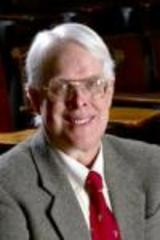J. Michael McBride
Richard M. Colgate Professor of Chemistry
 Mike McBride, B.A., M.A., Ph.D. Harvard, faculty member at Yale since 1966: You are a chemist with a special interest in crystals and other solids, in how chemical reactions occur, and in the history of organic chemistry. In your major research, your aim has been to study in detail reactions where bonds break. When these reactions occur in liquids, the process is so fast that it is impossible to obtain information about the pathway. By studying the processes with the starting materials in crystals, you have been able to observe a number of discrete steps in these reactions.
Mike McBride, B.A., M.A., Ph.D. Harvard, faculty member at Yale since 1966: You are a chemist with a special interest in crystals and other solids, in how chemical reactions occur, and in the history of organic chemistry. In your major research, your aim has been to study in detail reactions where bonds break. When these reactions occur in liquids, the process is so fast that it is impossible to obtain information about the pathway. By studying the processes with the starting materials in crystals, you have been able to observe a number of discrete steps in these reactions.
You have accomplished this by mastering techniques few organic chemists ever do. You learned yourself how to perform x-ray crystallography and to master electron paramagnetic resonance spectroscopy, usually the work of physical chemists. One can consider what you have accomplished as analogous to obtaining a number of individual frames from a movie that is moving so rapidly that that only a blur can be discerned when it is played at full speed. By “stopping the blur” through a sequence of frozen images, your work has yielded information about the pathway reactions take. Your main scientific contributions have derived from this mastery and they have been well honored. The Prelog Medal, awarded by the Organic Chemistry Laboratory of the Swiss Federal Institute of Technology, was conferred on you for distinguished achievement in the chemical world, recognizing not only your excellence in chemistry, but also your fundamental contributions to the field of stereochemistry.
Still, in your more than 45 years at Yale, your research has been only part of your achievement. You have served as a willing soldier on virtually every committee of the University, far too many to record here. Most importantly, you are renowned as one of Yale’s truly legendary and inspiring teachers. You earned the Nobel Laureate Signature Award for Graduate Education from the American Chemistry Society in 1987 and a Catalyst Award of the Chemical Manufacturers Association for undergraduate education in 1996. The Richard M. Colgate Chair, which you occupy, is specifically intended for a distinguished educator of freshmen. This is highly appropriate since hundreds upon hundreds of Yale’s finest undergraduate Chemistry students have begun their work over the years with your Freshman Orgo – a course as brilliantly taught as it is famously demanding. The substance, clarity, patience, fairness, organization and enthusiasm you have brought to your teaching has been recorded for the world to view on Yale Open Courses. Always thinking of how to make science more galvanizing for undergraduates, from 1989 to 1993 you led the planning and implementation of “Perspectives on Science,” a program aimed at attracting the best potential science students to Yale and stimulating them through freshman-year involvement in research and in wide-ranging, informal scientific discussions with one another and with faculty members.
As an undergraduate teacher there is, alas, no teaching award we can present you on your retirement, because you have already earned the two major Yale College teaching awards: the Dylan Hixon Award for Teaching in the Natural Sciences and the cherished DeVane Medal for Distinguished Scholarship and Teaching. A man who has as many interests as crystals have shapes and structures—a lover of birding, music, poetry and a passionate follower of U Conn women’s basketball—Yale salutes you as you enter a retirement that is sure to be multifaceted.
Tribute Editor: Penelope Laurans